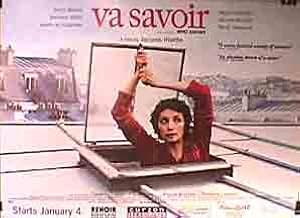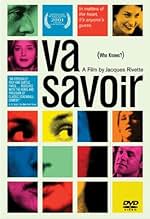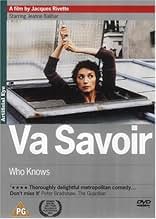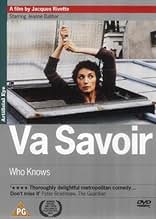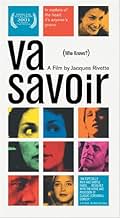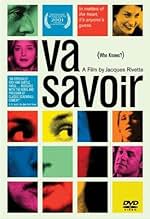CALIFICACIÓN DE IMDb
6.8/10
2.6 k
TU CALIFICACIÓN
Un grupo de teatro italiano se instala en París para representar una obra de Pirandello.Un grupo de teatro italiano se instala en París para representar una obra de Pirandello.Un grupo de teatro italiano se instala en París para representar una obra de Pirandello.
- Dirección
- Guionistas
- Elenco
- Premios
- 3 premios ganados y 3 nominaciones en total
Valeria Cavalli
- Ines
- (as Valéria Cavalli)
Opiniones destacadas
The play within a play ploy is used in Go Figure to excellent effect. The play is an eighteenth century farce performed by an Italian acting troupe visiting Paris. The farce utilizes six characters, the optimal number to engage in romantic mix-ups, flirtations, and other amorous stuff. And lo and behold, Go Figure itself contains six persons who engage in romantic mix-ups, flirtations, and crimes, both physical and of the heart.
There's the lead actress and her stage manager husband; she, who walked out on her now married ex-lover, whom she meets for the first time in three years (as well as his wife). Rounding out the six are two siblings, one a sexy young lady, the other her caddish older brother. There's jewel theft, a hunt for a missing manuscript, jealousy, and the falling in and out of love. And in the backdrop the acting troupe struggles to remains solvent.
All this is served up in, what I would call a French style. Of course I've not seen that many French romantic comedies, but I can state that were this in the hands of an American 'Hollywood' director it would be an entirely different film. And probably not nearly as good. In Rivette's hands all the action and interactions seem natural and light. There's no 'look at me' style of acting; it's almost understated. And this makes for a very enjoyable viewing that loses little on the small screen.
There's the lead actress and her stage manager husband; she, who walked out on her now married ex-lover, whom she meets for the first time in three years (as well as his wife). Rounding out the six are two siblings, one a sexy young lady, the other her caddish older brother. There's jewel theft, a hunt for a missing manuscript, jealousy, and the falling in and out of love. And in the backdrop the acting troupe struggles to remains solvent.
All this is served up in, what I would call a French style. Of course I've not seen that many French romantic comedies, but I can state that were this in the hands of an American 'Hollywood' director it would be an entirely different film. And probably not nearly as good. In Rivette's hands all the action and interactions seem natural and light. There's no 'look at me' style of acting; it's almost understated. And this makes for a very enjoyable viewing that loses little on the small screen.
The only time I felt anything for one of the characters here was near the beginning, when Camille, the lead actor in a Parisian production of a Pirandello play, a French woman speaking in Italian, has trouble remembering her lines (she is pre-occupied by a past love affair which had taken place in that city). The rest of the time I was either mildly amused, or just bored. It is hard to find empathy with a group who seem to be as artificial off the stage as they are on it. There are some nice moments, especially when Ugo fends off temptation from the lovely Dominique, and the duel scene between Ugo and the prat of a philosopher who was once his partner Camille's lover, but the whole thing takes far too long (2 hours 20 minutes), lacks tension and above all calls for minimal involvement on the part of the viewer.
It's rather interesting that Ugo is searching for an unpublished 18th century play. If theatre is to avoid being relegated to museums, producers need either to put on new stuff, or at least to present old material in an innovative way. Ugo seems to regard the past as more important than the future (a pointer, perhaps to the age of the director here).
The atmosphere here reminded me of `Amelie'. Both films have popped up at various film festivals around the world as examples of current French film production. If they are typical, then you might think the French film industry is headed for irrelevancy, but the Marseilles films of Robert Guediguian fortunately suggest otherwise.
It's rather interesting that Ugo is searching for an unpublished 18th century play. If theatre is to avoid being relegated to museums, producers need either to put on new stuff, or at least to present old material in an innovative way. Ugo seems to regard the past as more important than the future (a pointer, perhaps to the age of the director here).
The atmosphere here reminded me of `Amelie'. Both films have popped up at various film festivals around the world as examples of current French film production. If they are typical, then you might think the French film industry is headed for irrelevancy, but the Marseilles films of Robert Guediguian fortunately suggest otherwise.
I felt I should like this film more than I did. It is set in current day Paris where a theatre troupe is putting on a Italian production. The story revolves around a French actress in the troupe who is married to the director of the theatre group who is returning to Paris for the first time in years and still has unresolved feelings for an ex who resides in the city. The acting is solid if not very good, and the plot does hold interest and hangs together well. Having said this I could not help but feel the whole thing was somewhat slight and the payoff in time (it is or seemed like a very long movie) was somewhat unjustified. In some ways the characters seemed almost distant to me, they were real but I couldnt get inside their head, which in some ways is a silly criticism because life is like that and that is not necessarily a detraction for the film but I felt as though they were drifting through a series of set pieces with not all that much at stake. Having said this it is definitely worth a look and certainly should be sought if you enjoy cinema that goes beyond the pedestrian plot lines and pyrotechnics of all too many mainstream features today.
I was bored to death by this movie. The main character is a self-centered and selfish actress whose problems failed to interest me. I stayed with it for an hour, and walked away; my wife said it became somewhat better toward the end. If all drama must be divided into comedy and tragedy, then in that sense this is a comedy. However, when movie reviewers call a movie a comedy, I think we are entitled to believe they mean it is funny. Tastes differ, and I accept that some might find this movie interesting, but by no stretch of the imagination could anyone in his right mind call it "funny." I wouldn't have rented this video except for a quotation on the box, in which A. O. Scott of The New York Times wrote, "An especially rich and subtle farce . . . resolved with the verve and precision of classic screwball comedy."
Some years ago Sophie Marceau explained her move to Hollywood in more or less the following terms: I am tired of doing the same French movies where all in all there is a love triangle and in the end the three of them have dinner together. Well, Va savoir is exactly that kind of movie. It is more complicated because there are actually four love triangles, but yes, they all have a cake to share in the end; all the six people who were involved in the triangles. So nothing new here. The good thing, however, are the characters. Except for the brother-and-sister duo who are kind of stereotypical and possibly present the spectator with the cliché of male and female libertine Parisians, the other two couples arouse our curiosity with their insufficiencies: Camille is a little too absent-minded to be completely sane, Pierre is a typical academic dork who falls into furies of sophisticated frustration, Ugo visibly carries the burden of his unattractive appearance and compensates for it with his thick Italian accent, while Sonia obstinately tries to keep to the level of those intellectual pricks and prove how much more she knows about real life. This is a good melodrama if you like the genre. I do, and I liked it. Marceau probably wouldn't.
¿Sabías que…?
- TriviaSergio Castellitto dubbed himself in the french version, while Jeanne Balibar dubbed herself in the italian's.
- ErroresA child and a bicycle in the background disappears between shots in the park.
- Citas
Cammille B.: I really should calm down. I knew this would happen. It was coming. I should have said no, not a chance, not Paris. Even three years later, I can't.
- Versiones alternativasRivette's original 220 minute cut called Va Savoir+ premiered on 24 April 2002 and ran for seven weeks at only one theater, the Cinéma du Pantheon in Paris, selling a total of 1,734 tickets. Rivette said that Va Savoir+ was a completely different film than Va Savoir, the major difference being lengthy scenes of the actors performing Pirandello's "Come tu mi vuoi" instead of just rehearsals. The director stated that in the longer version, Pirandello's play is "another character" in the film.
- ConexionesFeatured in Tempus fugit, manet amor: Jacques Rivette à propos de Va savoir (2008)
Selecciones populares
Inicia sesión para calificar y agrega a la lista de videos para obtener recomendaciones personalizadas
- How long is Who Knows??Con tecnología de Alexa
Detalles
- Fecha de lanzamiento
- Países de origen
- Sitio oficial
- Idiomas
- También se conoce como
- Who Knows?
- Locaciones de filmación
- Productoras
- Ver más créditos de la compañía en IMDbPro
Taquilla
- Total en EE. UU. y Canadá
- USD 907,323
- Fin de semana de estreno en EE. UU. y Canadá
- USD 43,010
- 30 sep 2001
- Total a nivel mundial
- USD 2,039,644
- Tiempo de ejecución2 horas 34 minutos
- Color
- Mezcla de sonido
- Relación de aspecto
- 1.85 : 1
Contribuir a esta página
Sugiere una edición o agrega el contenido que falta

Principales brechas de datos
By what name was Quien sabe... (2001) officially released in Canada in English?
Responda






